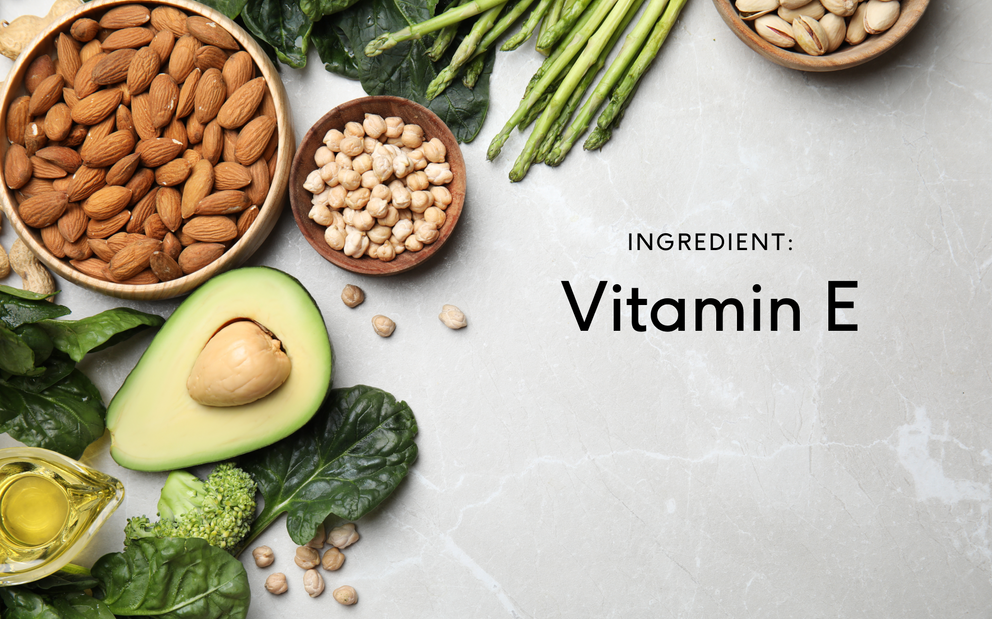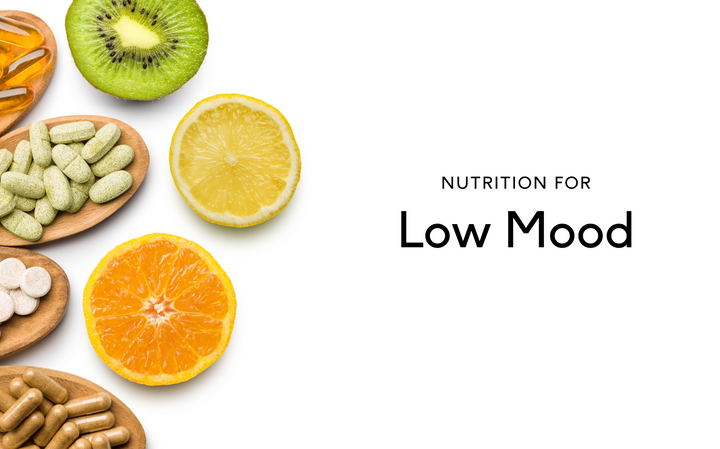Learn About Vitamin E in 5 Minutes
Table of contents

What is vitamin E?
Vitamin E is an essential nutrient and a powerful antioxidant. While there are eight different forms of natural vitamin E, D-alpha-tocopherol succinate is the best for human consumption, and this substance protects your tissues from the oxidative stress caused by free radicals.
- Improves cell life for healthier tissues
- Powerful antioxidant that protects you from free radicals
- Improves your eyesight and prevents cataracts
- Stimulates prostaglandin production to help you recover from exercise
- Supports healthy immune function
- Reduces the likelihood of heart disease
- Helps your skin and hair look and feel healthy
Why we love vitamin E
Getting enough vitamin E every day is essential to your health and well-being. This vitamin is one of the most powerful natural antioxidants in the world, and antioxidants protect your tissues from free radical damage. Oxidation is the primary cause of inflammation, which means that ingesting plenty of vitamin E can reduce the symptoms of inflammatory conditions.
Research also suggests that vitamin E improves your eye health, attenuates your blood pressure, and helps your muscle tissue repair itself after exercise. Ingesting the proper amount of vitamin E every day may even protect you from a variety of cardiovascular diseases. Vitamin E even improves the production of immune cells like interferons, immunoglobulins, and interleukins.
Unbelievable benefits of vitamin E
Here are some of the most impressive benefits of vitamin E that science has uncovered so far:
Antioxidant Benefits
Since shortly after its discovery, scientists have noted the profound antioxidant benefits of vitamin E. This vitamin is one of the primary components of the body’s antioxidant system, and you can only replenish your body’s vitamin E levels through diet.
Because of its antioxidant action, vitamin E also has anti-inflammatory properties. It also prevents platelet aggregation, which can lead to an increased inflammatory response. Since vitamin E acts as an anti-inflammatory, it may protect your body from a wide variety of inflammation-related conditions, and it may also help you live longer by preventing cell death.
Cardiovascular Benefits
Vitamin E has been shown to have cardiovascular protective effects in people with severe oxidative stress. As an antioxidant, vitamin E protects cardiovascular tissue from the dangers of oxidation, and this vitamin may specifically be effective in preventing atherosclerosis. While scientists haven’t fully established the role that vitamin E plays in atherosclerosis, the inflammation theory of this disease dictates that vitamin E would reduce the risk of this condition.
Eyesight Benefits
Research has indicated that vitamin E may prevent age-related eye conditions like cataracts. Oxidation is the main cause of cataracts, and the antioxidant effects of vitamin E have shown promise in protecting the eyes from age-related damage.
Muscular Benefits
Antioxidants like vitamin E increase the levels of prostaglandins in your blood, which are hormones that your body uses to maintain your muscular tissues. Since vitamin E supplementation improves your prostaglandin levels, ingesting a healthy dose of this vitamin can help you recover from exercise, and vitamin E also prevents muscular degeneration.
Immune Benefits
Research indicates that vitamin E is an integral component of the immune system. This vitamin E balances a number of the proteins and enzymes involved in maintaining the immune system, and this vitamin also appears to improve the effectiveness of influenza vaccinations in older patients.
Skin and Hair Benefits
Vitamin E is one of the primary components of human skin, so getting enough vitamin E in your diet is essential to maintaining optimum skin health. This vitamin also stimulates collagen synthesis, which helps both your hair and skin look and feel healthier.
Vitamin E contributes to meany health-promoting processes throughout the body, which is why Feel Multivitamin includes 12mg of Vitamin E, 100% of your daily recommended intake.
Is vitamin E water-soluble or fat-soluble?
Vitamin E is a fat-soluble vitamin, which means it takes your body a while to absorb this nutrient. Also, fat-soluble nutrients get stored in your liver and other fatty tissues for quite some time.
Where can vitamin E be found naturally?
Luckily for vegans and vegetarians, the most plentiful sources of vitamin E are plant-based. Examples of good plant sources of this nutrient include vegetable oils, nuts, and seeds.
5 foods/drinks containing vitamin E
1. Wheat germ oil 100% DV per 1 tablespoon or 15ml
2. Sunflower seeds 37% DV per 28g
3. Almonds 34% DV per 28g
4. Safflower oil 25% DV per 1 tablespoon or 15ml
5. Hazelnuts 22% DV per 28g
What is the recommended daily intake for vitamin E?
The nutrition scientists at the National Institutes of Health (NIH) suggest that adult men and women should consume 15mg of vitamin E per day. This recommended daily amount (RDA) stays the same for pregnant women, but it jumps to 19mg for women who are lactating.
What to consume to get a full daily dose of vitamin E?
Wheat germ oil - approximately 1 tablespoon or 15ml
Sunflower seed oil - approximately 85g
Almonds - approximately 85g
Sunflower oil - approximately 4 tablespoons or 60ml
Hazelnuts - approximately 141g
Can you absorb enough of vitamin E from food?
If you like to eat nuts or you aren’t afraid to swallow a tablespoon of wheat germ oil every day, it’s relatively easy to get enough vitamin E from the food you eat. However, going out of your way to consume these specific types of food might be more complicated than simply taking a multivitamin that contains exactly 100% of your RDA of vitamin E.
Why is vitamin E necessary for your body?
As an antioxidant, vitamin E disrupts the formation of reactive oxygen species (ROS), which are the primary causes of oxidative stress throughout your body. Scientists believe that reducing oxidative stress can protect you from a variety of kinds of disease, and in addition to its antioxidant properties, vitamin E also has immune, gene expression, and cell signalling functions.
Functions of vitamin E
Oxidative stress reduction: The primary role of vitamin E is as an antioxidant. Atoms with unpaired electrons create ROS, and these oxygen species then wreak havoc on your cells. Vitamin E specifically disrupts the production of ROS that would otherwise happen when fat oxidises.
Immune modulation: Vitamin E boosts the functioning of the immune system to prevent infection and defend you against pathogens.
Gene expression: Vitamin E helps your genes express themselves properly to protect your health and well-being.
Cell signalling: Your body uses vitamin E in a variety of critical signalling processes within cells.
Symptoms of vitamin E deficiency
Peripheral Neuropathy
Peripheral neuropathy is caused by neuronal cell death in your hands and feet, and it results in tingling, numbness, or pain in these parts of your body.
Immune Impairment
Since vitamin E is critical for the proper functioning of your immune system, deficiency in this vitamin may result in impaired immune reactions to pathogens and infections.
Muscle Weakness
Severe vitamin E deficiency causes skeletal myopathy, which is a type of muscular atrophy that causes weakness throughout your body.
How long do you need to take vitamin E to start experiencing its benefits?
The water-soluble form of this nutrient absorbs quickly, but other types of vitamin E do not absorb so fast. Therefore, it may take days or weeks for you to start to feel the benefits of vitamin E supplementation.
Consistency is key and our research recommends taking your Feel supplements for at least 3 months to allow your body to adjust and provide the desired benefits.
How long does it take for your body to digest/absorb vitamin E?
The absorption process for vitamin E is very complex, and absorption rates vary from person to person. Depending on your age and relative health, D-alpha-tocopherol succinate may absorb at different rates. As a fat-soluble nutrient, however, vitamin E will always absorb slower than a water-based vitamin.
How long does vitamin E stay in your body after you take it?
Vitamin E may be stored and remain in your body for days, weeks, or even months after you ingest it.
Is vitamin E an antioxidant?
Vitamin E is one of the most powerful antioxidants ever discovered. As such, it fights back against oxidative stress and inflammation to prevent disease.
Can you overdose on vitamin E? What are the effects?
Adults can generally safely tolerate vitamin E doses as high as 1000mg per day, but high doses of this nutrient are not recommended. It’s possible that long-term overdosing on vitamin E can result in impaired blood clotting, which can cause wounds to bleed for longer than they should and promote dangerous internal bleeding. Keep these symptoms at bay by never exceeding your RDA for vitamin E.
Does vitamin E dissolve, flush out, or build up in the body?
Vitamin E builds up in your bodily tissues, but it flushes out eventually.
Can you take vitamin E during a diet?
There’s no reason you shouldn’t take vitamin E while you’re dieting.
Are there synthetic forms of vitamin E?
There are a few different synthetic forms of vitamin E. DL-α-tocopherol acetate is one of the most common synthetic forms of this nutrient.
Why might synthetic forms of vitamin E be better?
The only known advantage of synthetic vitamin E is reduced production cost.
Absorption rate of synthetic vitamin E
Synthetic vitamin E has a very poor absorption rate as compared to D-alpha-tocopherol succinate.
Why might natural forms of vitamin E be better?
Natural vitamin E appears to be absorbed better by the body, and some sources contend that D-alpha-tocopherol succinate may be up to twice as effective as synthetic alternatives.
How to take vitamin E
You can consume vitamin E in food, but it might be easier to get the D-alpha-tocopherol succinate you need in supplement form.
Why everyone should be taking WeAreFeel supplements
Your body needs plenty of antioxidants to protect your health and well-being, but unfortunately, most people don’t consume nearly enough of these free-radical-fighting substances. While it’s easier to consume vitamin E than it is to consume other essential nutrients if you’re a vegetarian or vegan, the fact remains that people with busy lifestyles don’t have the time to enjoy healthy diets.
With Feel, you can rest easy knowing you got enough dietary vitamin E without having to change your diet. Instead of forcing yourself to eat lots of nuts to avoid vitamin E deficiency, get all the vitamin E you need with a daily capsule of Feel!
Here’s the Proof
- The Role of Vitamin E in Human Health and Some Diseases
- Vitamin E in the prevention of cardiovascular disease: the importance of proper patient selection
- The role of vitamin E in atherosclerosis.
- Nutrients for the ageing eye
- Effect of vitamin C and vitamin E on prostaglandin synthesis by fibroblasts and squamous carcinoma cells.
- Vitamin E and immunity.
- Vitamin E supplementation and in vivo immune response in healthy elderly subjects. A randomized controlled trial.
- Depletion of human stratum corneum vitamin E: an early and sensitive in vivo marker of UV induced photo-oxidation.
- The effect of reactive oxygen species on the biosynthesis of collagen and glycosaminoglycans in cultured human dermal fibroblasts.























































 Back
Back



